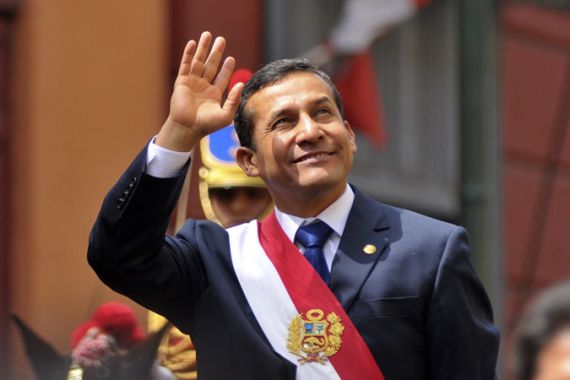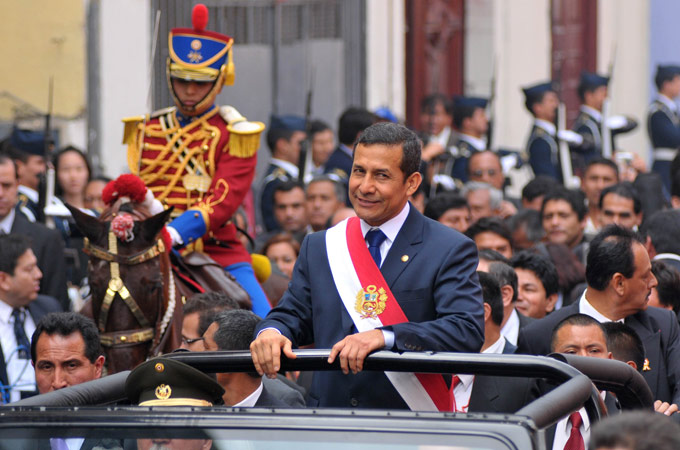Peru’s new president: ‘poor are my priority’
Left-leaning Ollanta Humala, 49, must balance pledges to Peru’s poor with the pro-business pacts of his predecessors.

 |
| Peru’s new president, pictured, played down his ties to Venezuela’s leftist president, Hugo Chavez [Reuters] |
Leftist former army officer Ollanta Humala has been sworn in as president of Peru, aiming to confront the high poverty plaguing the nation despite recent years of solid economic growth.
The 49-year-old former army lieutenant colonel on Thursday charted a plan for spreading the wealth from Peru’s mineral boom beyond Lima, where it has been concentrated among a small elite, to long-neglected rural areas.
“We want to erase the word ‘social exclusion’ from our vocabulary and our reality forever,” Humala said in remarks before a newly installed Congress and dignitaries who included 11 presidents, almost all from South America. “Peru’s peasants and the poor in the countryside in general will be the priority.”
He quoted South Africa’s anti-apartheid hero and former president, Nelson Mandela, in arguing there can be no democracy where misery and “social asymmetry” persist.
The successor to centre-right leader Alan Garcia starts his five-year term with high expectations from the 30 per cent of Peru’s 28 million people who live in poverty, but he has also inherited dozens of social conflicts that will test the strength of his cabinet.
Balancing expectations
Humala successfully played down his ties to Venezuela’s leftist president, Hugo Chavez, and played up links with Brazil’s more moderate left in his second campaign for the presidency, the AFP news agency reported.
He says he is inspired by Brazil’s ex-president Luiz Inacio Lula da Silva who was able to reduce poverty while fostering economic growth.
Humala won a second round run-off in June with a three-point lead over Keiko Fujimori, daughter of Peru’s disgraced former president Alberto Fujimori.
He brought together liberals and moderate leftists for his eclectic first cabinet, including leftist writer Rafael Roncagliolo as foreign minister and millionaire businessman Salomon Lerner as his cabinet chief.
Humala also named a singer, renowned Afro-Peruvian artist Susan Baca, to lead Peru’s culture ministry. She is Peru’s first black cabinet member.
Analysts say he managed to allay fears that he would follow the “20th century socialist” path of Venezuela’s Chavez, such as nationalising key industries.
Campaign promises
Humala will face a daunting juggling act in his pledge to prioritise the poor. He also signalled his intention
to maintain the business status quo and honour all international pacts, including a raft of free-trade agreements enacted by his predecessors.
To reassure foreign investors, Humala retained the incumbent central bank chief, Julio Velarde, and named as finance minister Luis Miguel Castilla, a deputy finance minister for the past year and a half in the outgoing
government.
Humala did not explain how he planned to pay for the generous social programs he catalogued on Thursday, most of which he promised during the campaign, though he has said he intends to seek taxes on windfall mining profits.
The pledges include modest old-age pensions for Peruvians at age 65, beginning with the neediest; raising the minimum monthly wage in two stages from $218 to $270 by next year; free preschools in Peru’s poorest districts, college scholarships for top-performing needy students and building hospitals in 50 cities where they are lacking.
The first minimum wage increase – $27 – is slated for next month.
Humala also promised to invest in public transportation in the traffic-choked capital of Lima; to expand highways and railways; to rebuild Peru’s merchant marine and to re-establish a national airline. Aeroperu went bankrupt in 1999.
Challenges ahead
Humala will not have an easy time in congress, where his party has just 47 of 130 seats and will have to depend on lawmakers from the Peru Posible party of former President Alejandro Toledo for a majority.
The main opposition in Congress comes from the Fujimori camp, the second-biggest voting bloc. Humala narrowly defeated Keiko Fujimori, daughter of imprisoned former President Alberto Fujimori, in a June 5 runoff.
The Fujimoristas tried to shout down Humala when, during his swearing-in, he said he was assuming power in the spirit of the 1979 constitution.
Humala led a failed military revolt in 2000 against Alberto Fujimori just before the latter fled into exile, for which he was jailed and then received a congressional pardon.
He has long been plagued by the antics of his family, including radical nationalist outbursts from his father, a failed 2005 uprising by one of his brothers, who is now in jail, and a recent visit to Russia by another brother
who conducted a rogue gas deal talks without his consent.
Alan Garcia, who narrowly defeated Humala in the 2006 race, broke with tradition and opted not to attend the inauguration. He left the presidential palace more than an hour before his successor’s swearing-in, getting into a black SUV with tinted windows and departing without any applause.